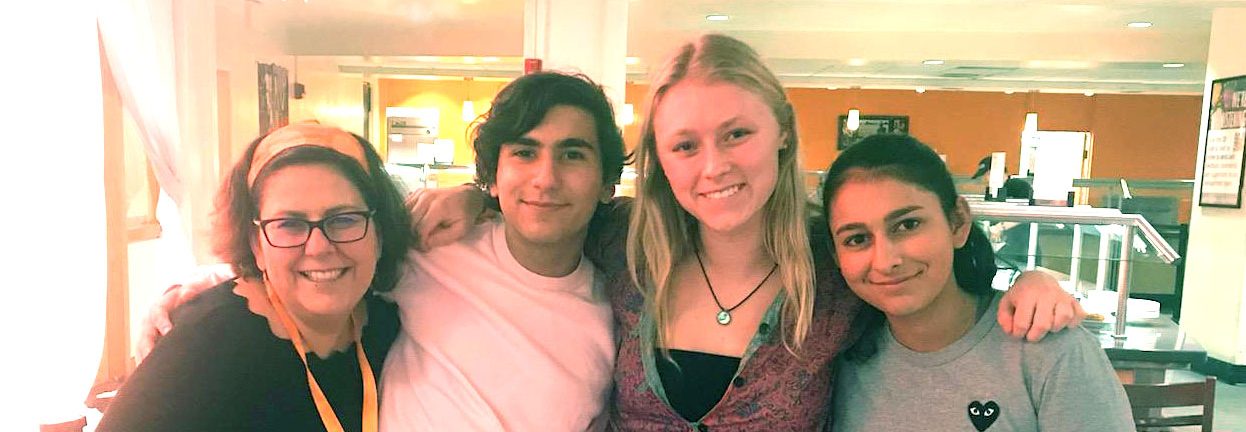Survive to Thrive—The Betsy Craig Story
College Bound with Food Allergies: Tips
The Food Allergy Diagnosis: Grieve then Move Forward
Allergic Living: How to Build ‘Can-do’ Confidence
Allergy Force recently spoke with Kortney Kwong Hing, food and travel blogger and co-founder and creative force behind a new online magazine that celebrates life with food allergies with positivity and a can-do mentality — Zestfull.
Teens and young adults face tremendous pressure to fit in, to be social. Being social often means eating out, going to parties, attending team events, navigating high school and college cafeterias—lots of activities where you connect with friends and teammates over food. And then there’s life after college when you’re finding your footing and making lifestyle choices solo.
“You have to figure out how to have peace of mind and keep yourself safe mentally and physically.“
After college, Kortney moved to Germany and found herself drowning in a language she couldn’t speak {yet}. In Germany, the language barrier drastically shrank her world. Her allergies became excuses to avoid uncomfortable situations. She admits using the opt-out option regularly. It just felt safer.
“The fears and anxieties I experienced in Germany when I first moved,” Kortney recalls, “made me see that maybe what I felt, other people were feeling, too.” Even though she had mixed feelings about publicly sharing her personal journey, this insight inspired her to try and help the generation of allergy kids coming up and encourage their parents to have more faith and give their kids more confidence.
To do this, she launched the Allergy Girl Eats blog in 2015 (recently rebranded as an online magazine for food allergies— Zestfull.) “You can give people confidence. It just depends on the framework you use to look at the challenge.”
“When you’re open to it, connection with others with
food allergies gives you courage and helps you cope.”
As a teen or young adult, when you don’t know other people with food allergies, there’s trepidation. You’re not sure what other teens and young adults with food allergies feel in different situations. You don’t know how they get past all the negative feelings that chip away at their confidence and psyche them out. There’s no how-to plan, no trail to follow. When you do know others with food allergies like you, it shifts your perspective and validates your feelings.
She offers the following framework to help teens and young adults build confidence:
1. Embrace the fact that you have food allergies. They are a part of you. If you just embrace them, they don’t become everything. They don’t define you. You move on with the rest of your life. Finding that balance is important. You don’t want to dismiss allergies as not being important to talk about, but you don’t want to over-focus. How do I live? How do I not let food allergies control my life?
Embrace. Accept. Move forward.
2. Don’t be afraid to talk about your allergies. Don’t be afraid to tell people about them, whether it’s a new roommate or a very special someone. Think about it like an ‘elevator pitch’. If you have your pitch polished, you’re not as afraid to talk about your allergies when the time is right. You can find your ‘allergy voice’.
- Know enough to feel informed.
- Know your allergy story so it flows.
- Know how you’ll spin the conversation to your food allergies, then spin away.
- Pick your moment.
Finding the right moment is hard. Finding what to say is hard. Finding the right words is hard. Finding the right time is hard. But you can do it.
3. Learn from other people’s experiences. Seek out content that departs from a ‘can do’ place. For example, Kortney’s new online venture focuses on living your food allergic life with a Zestfull outlook and spirit, and her podcast, ‘The Itch Podcast’ unpacks allergies, asthma and immunology with easy to understand information backed by scientific evidence.
A focus on the positive, the avoidable, the controllable keeps you from falling into the rabbit hole of fear and anxiety.
4. Find an allergy buddy. It takes the edge off having to manage the emotional part of food allergies all by yourself when you can find someone to sanity-check your feelings. Kortney’s found ‘allergy buddies’ around the world —sometimes next door, sometimes 8 time zones away — and they’ve made navigating foreign travel and living day-in, day-out with food allergies much easier.
When you’re going it alone, an allergy buddy can lighten the load of emotions triggered by food allergies.
5. Give yourself ‘permission’ to explore the world and think bigger, broader when you do. Exploring a region’s culinary delights on a global adventure does not have to top your bucket list. Soak up the culture, the history, (the sun?) and stick to very basic foods. Make sure you have your epinephrine with you and be aware of ER locations nearby.
Remember, there’s so much more to going global than the food.
6. Don’t ever second guess an allergic reaction. If you think you’re having an allergic reaction follow your emergency action plan. To. The. Letter.
With the onset of a reaction, even a ‘maybe’ reaction, do NOT overthink. Use your epinephrine. Time is of the essence.
“Food allergies and the accompanying fear and anxiety are not something you can manage in a balanced way,” explains Kortney. “You carry them with you, every second of every day. You have to figure out how to have peace of mind and keep yourself safe mentally and physically. “
Making a difference with zest…
Kortney manages multiple food allergies, asthma, eczema and OAS. They’ve been a fact of life for her since her earliest days. She is a food allergy changemaker who shares heart and creativity to make allergic living easier for others through kitchen adventures, the online community Allergy Travels and co-hosting The Itch Podcast with Dr. Payel Gupta.
Over the past year, Kortney did a lot of soul searching and concluded it’s time for a change. After five years of helping countless people navigate food-allergic living on the road and in the kitchen, Kortney announced she would rebrand the Allergy Girl Eats blog and pursue her NEXT. Zestfull — an online magazine that celebrates life with food allergies — launched September 2020. Kortney, co-founded Zestfull with food allergy mom, friend and partner, Shahla Rashid (founder of My Berkeley Kitchen.) to bring even more positivity to the food allergy community.
Thank you, Kortney, for all you do for people navigating life with food allergies. Wishing you ‘zest’ and success with your NEXT!
“You can have a full life with food allergies, it may just be lived a little differently!”

The Allergy Force Changemaker Series shines a light on movers and shakers in the food allergy community who drive change and bring positivity to the space for the benefit of the entire community. |
|
Image Credit: Thank you to Kortney Kwong-Hing for sharing the image











